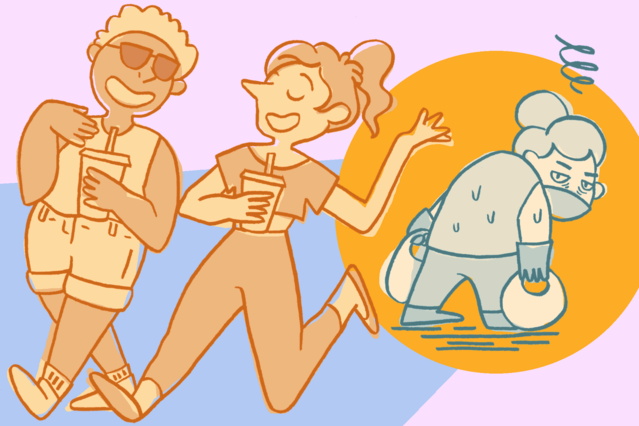Proxemics
The Pandemic Has Stolen Our Personal Space Boundaries
Losing control of our personal space and privacy tests our mental health.
Posted February 25, 2021
- The pandemic has caused a loss of three forms of control over our personal boundaries: personal space, privacy, and the spaces that serve a function in our daily lives.
- Losing control over these basic boundaries makes it harder to balance being alone and being together, which can affect mental health.
- Some ways to help us manage our personal boundaries include modifying our homes to create mini-territories for specific activities and respecting others' needs for privacy.

As the pandemic wears on are you feeling less motivated and more depressed? More anxious? Out of control? From a psychological standpoint, it’s not surprising. As a lengthy, unpredictable and uncontrollable stressor, the pandemic steals our feelings of personal control where it hurts—our jobs, relationships, finances, education, health, recreation and travel. And that’s not the only theft of our personal control that makes things feel out of control. The pandemic also steals three of the most basic forms of personal boundary control:
- Control over the space around our body (personal space) ·
- Control over who we have contact with and when (privacy)
- Control over the physical spaces that serve a central function in our daily lives (territoriality)
To feel in control of our lives, we need to control these basic boundaries.
Personal space is the invisible boundary we claim around our bodies. We space ourselves from others so that we feel safe from physical threat and to reduce sensory overload (the closer people are, the more sensory input they provide). Even in “normal” times, personal space invasions are uncomfortable. Depending on the person and the situation, they can be downright anxiety-provoking and stressful. But these are abnormal times. Controlling how close someone comes is key to increasing our feelings of control over an unpredictable virus. It’s no wonder we’re more likely to experience anger and anxiety in response to invasions and to respond verbally, or that many of us are staying in as much as possible. Meanwhile, the pandemic increases the number of perceived personal space invasions because the stakes are higher, and distances that were previously comfortable are now experienced as invasions.
Personal space distancing is also about relationships. Generally, we maintain smaller distances (under four feet, close enough to touch) between ourselves and the people we care about. But we have also lost control over this aspect of our personal space. We have to interact with close friends and family we don’t live with at distances normally reserved for strangers. It’s an upsetting loss of control for sure.
Privacy is another basic aspect of feeling like we have control over our lives. It’s also about controlling the boundaries between ourselves and others. Reflecting on the nature of privacy, psychologist Irwin Altman said that our desire to be alone and to be with others is dialectical. That is, the forces to be with others and away from others are both present with each stronger at different times. We need to be together when we want to be for love, laughter, friendship, support, and recreation. We need to be able to be alone when we want to be so that we can contemplate, process, and plan, manage our bodies, share intimate moments and information with trusted others, get a break from social contact, work and create, and consume embarrassing or forbidden foods, substances, or media.
I think you’ll agree that the pandemic has challenged our normal ways of maintaining a desired balance between being alone and being together. Solitude may be more difficult to achieve and loneliness harder to alleviate. We can’t easily spend time alone with friends or lovers (intimacy privacy) or be alone among the masses (anonymity privacy) by going to a gym or shopping. *
We also need our own physical spaces that we rule. Our feelings of personal control, security, and privacy are supported by personal primary territories that are used and controlled by us on a daily basis, and that we can customize and personalize. Having our own room, or part of a room, a specific space for our school, work, or hobby, even if it’s only a “mini-primary territory,” is important for feelings of control. This is particularly true during a pandemic when multiple household members are spending more hours living, working, and learning at home.
Tips for Managing Personal Boundaries During the Pandemic
So, the pandemic has reduced our control over the regulation of these personal boundaries and that loss of control has consequences for our mental health and our interpersonal relations. Where does this lead us? What can you do with this information? Here are some suggestions:
- To the extent that you can, modify your home environment to promote feelings of personal control and privacy. Create mini-territories, such as a parents’ workspace, or a student’s learning space. Respect others’ existing territories by leaving them largely untouched.
- Check yourself: Make sure your need for personal control isn’t causing you to be controlling (micromanaging and/or criticizing how other people complete tasks). You don’t want to reduce others’ personal control and contribute to their feelings of helplessness, depression, or anxiety. The flip side: If someone you live with has become more controlling, have empathy. Recognize that this may be in response to their feeling out of control.
- Support others’ needs for privacy, whether that is their need to be alone, or to be alone with others, like their friends. Respect others’ nonverbal signals of a need for privacy (like a closed door, staring at a phone, or leaving a communal space).
- Claim what personal control you do have by coming up with creative ways to achieve desired levels of privacy and social contact.
- Reframe. View keeping safe personal space distances as a personal choice you make to protect yourself and others. Remind yourself that the pandemic will end. Time goes by quickly. You will get through this and it will be sweet when things get back to normal.
- Wear your mask. Socially distance. Get vaccinated when you can. Taking control means doing your part to reduce infections and get things back to normal.
Take care, my friends.
*However, I’m concerned that in some cases the pandemic has created too much solitude. Not only because this may lead to loneliness, but because it may enable the secrecy needed for some drug and alcohol addictions and eating disorders.
References
Altman, I. (1975). The Environment and Social Behavior: Privacy, Personal space, Territoriality and Crowding. Brooks Cole.
Gifford, R. (2017). Environmental Psychology: Principles & Practice. Optimal Books.
Hall, E.T. (1966). The Hidden Dimension. Doubleday.
Sommer, R. (1969). Personal Space: The Behavioral Basis of Design. Prentice Hall.
Westin, A.F. (1967). Privacy and Freedom. Atheneum.




